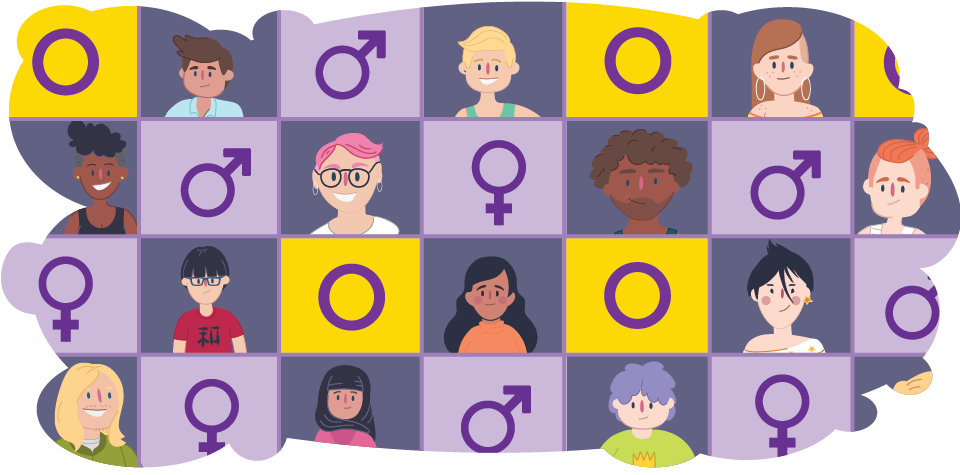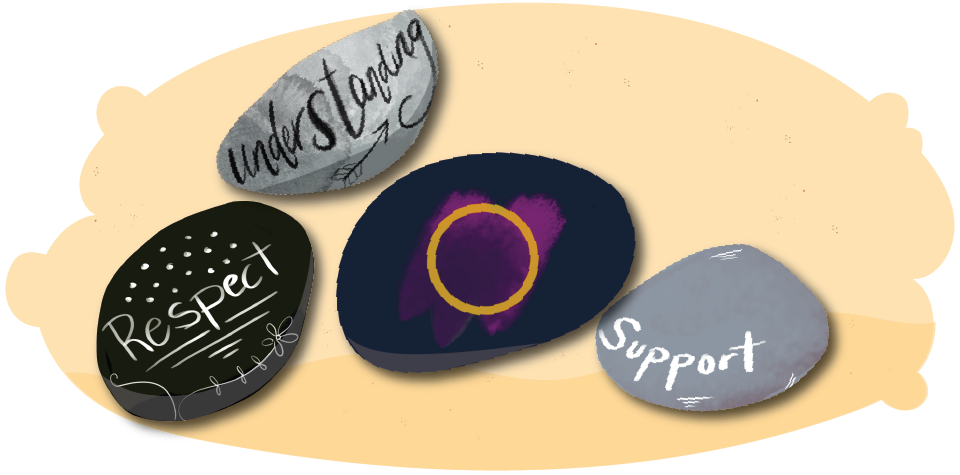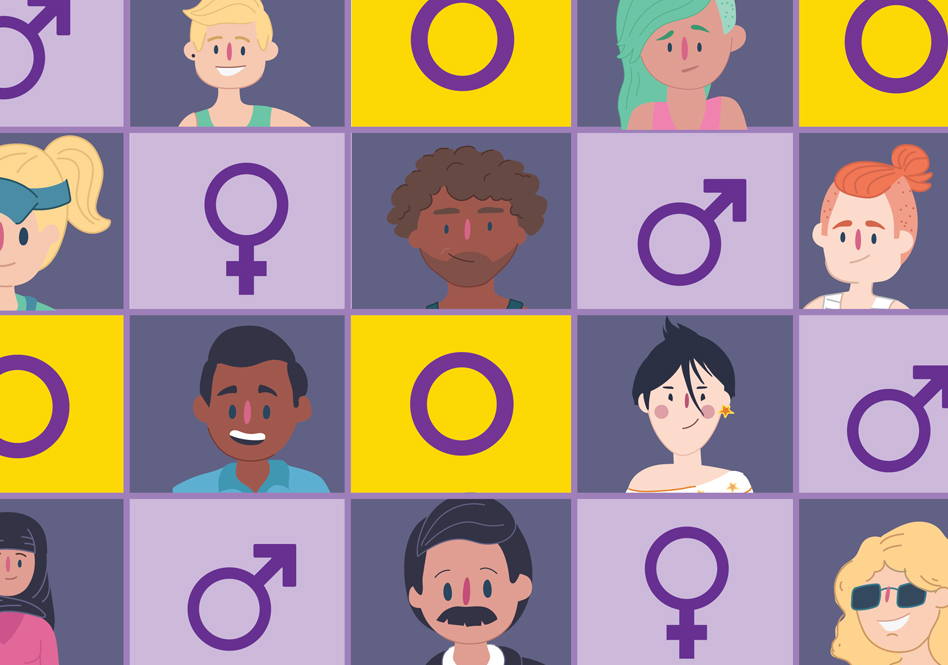Understanding people with intersex variations
'Intersex' is a term used to describe people born with variations that don’t fit doctors' expectations of a male or female body.

This article was reviewed by people in LGBTIQA+ communities.
What are intersex variations?
When we are born, doctors decide our sex based on expectations about what they think a male or female body should look like.
People with intersex variations are born with physical features – like genitals, chromosomes or hormones – that don’t fit doctors' expectations of a male or female body. 'Intersex' is a term used to describe these differences.
Here are some important things to know about intersex variations:
- In the same way that people have all kinds of bodies, intersex variations are a normal and natural variation in people’s bodies. Intersex variations are only one part of a person’s life – and do not define who they are or what they’re capable of!
- Like everyone else, intersex people are assigned female or male by doctors, using tests if they aren’t sure how to assign an infant. Some intersex infants and children go through surgery or hormone treatment after sex assignment, which can be harmful, especially if they aren’t given a choice in this decision.
- Intersex variations are not uncommon. It’s thought that up to 1.7 percent of the population experience intersex variations. That’s as common as people born with red hair or green eyes!
- Intersex variations are not always obvious at birth. For some people, they might not be obvious until later in life when their bodies do not respond in a way expected for a typical male or female body – like during puberty or if trying to have a baby.
- Intersex variations are really different, and even two people with similar intersex variations, will experience them in different ways. Some more common intersex variations people experience are: congenital adrenal hyperplasia, Klinefelter syndrome, hypospadias, and androgen insensitivity syndrome.
- People with intersex variations use many different words to describe their bodies, like: intersex variations, variations of sex characteristics, or differences of sex development. Rather than guessing, a good rule of thumb is to use the term a person with an intersex variation uses or ask them what term they would like you to use.
Bodies vs. identities
Many people mistakenly think that intersex is a term for a particular type of identity or body.
Here are some reasons why:
We’re usually taught by doctors, media, schools and others that there is one way to be male or female.
Being intersex can be confused with being transgender. Transgender means someone whose gender identity is different from their assigned sex at birth.
Intersex means someone born with sex characteristics that are different to what is thought to be "typical" for a male or female body. Most people with intersex variations grow up to identify with their sex assigned at birth – this is often called "cisgender".
Remember that intersex variations are about differences in bodies. People with intersex variations may identify with many sexual or gender identities. LGBTIQA+ communities can be a safe space for people struggling with ideas about how women and men should look or behave.
Discrimination toward people with intersex variations
The bodies of people with intersex variations are commonly seen as different, which puts them at risk of discrimination, abuse and harm. The most concerning type of discrimination and harm that intersex people face is being pressured or forced to have medical interventions to make their bodies look more "typically" female or male.
- Doctors and our communities can have very rigid views about how people should be. For intersex people, these views are about their bodies being and looking typically "male" or "female".
- Medical interventions are usually used because doctors and communities think that people need particular kinds of bodies to be "normal" or to stop bullying.
- These medical interventions are usually performed on minors who are too young to make decisions about their body and understand how it affects them.
- There is no evidence that surgery in infancy or childhood can stop bullying or make "normal" bodies. People with all kinds of bodies grow up to have all different kinds of identities.
- Medical interventions can have negative consequences on people with intersex variations as they get older – like pain, loss of sexual sensation, having a body different to one’s gender identity, and mental health issues.
- The issues that intersex people actually face, including infertility, scarring and specific health needs associated with their intersex variation can become lost in discussions about sex and gender identity.
- Because of the efforts of intersex advocates and their allies, there have been many steps taken to educate people about intersex variations, stop medically unnecessary interventions, and protect the legal and human rights of intersex people.
Some people may choose to have medical interventions on their body when they are older. The most important things about any decision is being able to choose freely, being able to make your choice without being pressured, being treated with respect and being given accurate information to help inform their choice. It's important to respect and support the choices people with intersex variations make about their own bodies and identities.

What can I do to help support people with intersex variations?
Here are some ways you can support a friend with intersex variations:
- Learn more about people with intersex variations. Check out internet articles, books, and other media about their experiences.
- Lots of people with intersex variations are worried that they are "abnormal". If a friend tells you they have an intersex variation, don’t make them feel worse by acting shocked, amazed, or sorry for them. Instead ask supportive questions like, 'How do you feel about it?’
- Don’t pressure a friend with an intersex variation to share information about their body or medical history with you or anyone else. Remember, it’s their experience and right to decide whether they share this information and with whom!
- Get involved in activism for intersex people by following a related social media page or helping people understand how diverse bodies can be.
- Bodily diversity is great – think about how you can speak out when you see or hear negative words about people's bodies.
"Intersex variations are about differences in bodies. People with intersex variations may identify with many sexual or gender identities."
- Alex, Kids Helpline Counsellor
Supports for people with intersex variations
It's your body, and it's ok to ask your doctors and parents for information about your body and your medical history. Here are some ways you can support yourself:
Need more support?
There are a range of support services available
Intersex Human Rights Australia - advocacy and information about your rights
Intersex Peer Support Australia - can help you build an online or offline network with other people with intersex variations and provide support
Interact Advocates - provides information about people with intersex variations
QLife - provides counselling support
Kids Helpline is also here to support you. Give us a call, send us an email or talk to us on WebChat.
Check these out too:
Sexual, gender and bodily diversity discrimination
Many LGBTIQA+ people face discrimination and prejudice that can affect their health, ...
READ MEGender Identity
There’s more to gender identity than being male or female. Learn ...
READ MESexual Identity
Relationships come in many forms. Learn more about sexuality and the different ...
READ MELGBTIQ+: The Ultimate Dictionary
A list of important words used in LGBTIQ+ communities
READ METalking helps! We’re here for you.
No problem is too big or too small.
We're here 24 hours a day, 7 days a week






